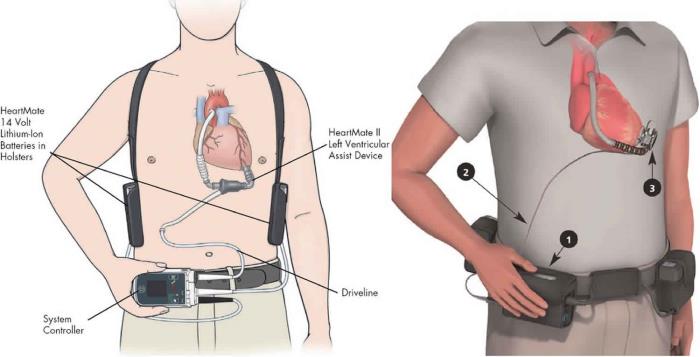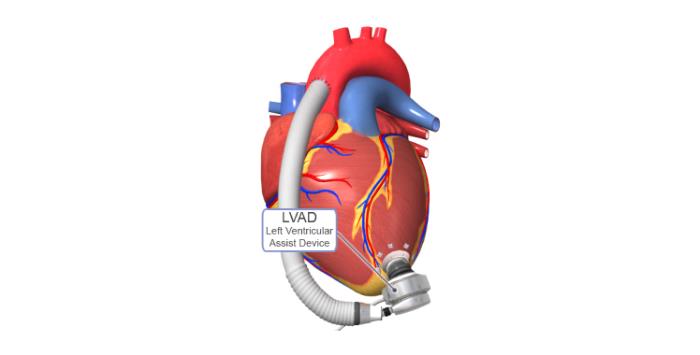Heart failure occurs when the heart is unable to pump enough blood to meet the body's needs, leading to fatigue, shortness of breath, and fluid retention. For patients with advanced heart failure, conventional treatments may no longer be sufficient, and surgical interventions, such as Left Ventricular Assist Device (LVAD) implantation, become necessary. LVAD surgery is a life-saving option that helps support heart function and improve quality of life for individuals awaiting a heart transplant or those ineligible for a transplant.
What is a Left Ventricular Assist Device (LVAD)?
A Left Ventricular Assist Device (LVAD) is a mechanical pump that helps the left ventricle, the heart's main pumping chamber, circulate blood throughout the body. It is implanted in patients with severe heart failure when the heart can no longer pump efficiently on its own. The LVAD works by taking over the pumping function of the left ventricle, providing sufficient blood flow to vital organs. LVADs can be used as a bridge to heart transplant or as a long-term solution for patients who are not eligible for a transplant.
Preparing for LVAD Surgery: Managing Advanced Heart Failure
Preparation for LVAD surgery requires careful management of advanced heart failure to optimize the patient’s condition before the procedure. Patients typically undergo a thorough evaluation, including tests to assess heart function, lung capacity, and other organ systems. Additionally, discussions with a multidisciplinary team are essential to help the patient understand the surgical process, recovery expectations, and lifestyle changes that will follow. Preparing emotionally and physically is key to improving surgical outcomes and easing the transition to life with an LVAD.

Medical Management of Heart Failure Before LVAD Surgery
Prior to LVAD surgery, medical management is crucial to stabilize the patient’s condition and minimize risks during the operation. Treatment strategies often include medications to reduce fluid retention, control blood pressure, and improve heart function. Diuretics, ACE inhibitors, beta-blockers, and other heart failure medications are used to relieve symptoms and reduce the strain on the heart. In some cases, temporary mechanical support, such as intra-aortic balloon pumps, may be required to assist heart function until the LVAD can be implanted.
Lifestyle Modifications to Support Heart Function Pre-Surgery
Lifestyle changes play a vital role in managing heart failure before LVAD surgery. Patients are encouraged to follow a low-sodium diet, limit fluid intake, and engage in light physical activity as tolerated to reduce the burden on the heart. Quitting smoking and reducing alcohol consumption are essential steps to improve overall heart health. Maintaining a healthy weight and following a prescribed exercise regimen can help patients improve their physical conditioning, which is crucial for a smoother recovery after surgery.

The Role of Medications in Stabilizing Heart Failure Before LVAD
Medications are a cornerstone of heart failure management, particularly in the lead-up to LVAD surgery. Diuretics help reduce fluid buildup in the body, while vasodilators and ACE inhibitors lower blood pressure and improve blood flow. Beta-blockers are used to slow the heart rate and decrease its workload, giving the heart a chance to recover some function. By stabilizing heart failure symptoms with these medications, healthcare providers can optimize the patient’s condition and increase the likelihood of a successful LVAD implantation.
Assessing Candidacy for LVAD: Key Factors for Success
Candidacy for a Left Ventricular Assist Device (LVAD) depends on several factors, including the severity of heart failure, overall health, and the patient's response to other treatments. Physicians evaluate heart function, kidney and liver health, and the presence of other medical conditions to ensure the patient can withstand surgery and benefit from the LVAD.
Pre-Surgery Monitoring: Keeping Heart Failure Under Control
Before LVAD surgery, patients must undergo intensive monitoring to keep their heart failure under control. This includes regular assessments of heart function, medication management, and lifestyle changes to reduce strain on the heart. The goal is to stabilize the patient as much as possible before surgery.
The Surgical Procedure: What Happens During LVAD Implantation?
LVAD implantation is a major surgery performed under general anesthesia. The surgeon attaches the device to the left ventricle and the aorta, which helps pump blood from the heart to the rest of the body. The LVAD is connected to a power source that exits the body through a small opening in the abdomen.

Immediate Post-Surgery Care: Managing Recovery in the ICU
After LVAD surgery, patients are moved to the intensive care unit (ICU) for close monitoring. This period is critical for stabilizing the heart, managing fluid levels, and ensuring that the LVAD is functioning properly. Patients typically spend several days in the ICU before transitioning to a regular hospital room.
Medications to Support Heart Function After LVAD Surgery
Post-LVAD, patients will be prescribed medications to support heart function and prevent complications. These include blood thinners to reduce the risk of blood clots, medications to regulate blood pressure, and drugs to manage any remaining heart failure symptoms.
How LVAD Helps Improve Heart Function in Heart Failure Patients
An LVAD improves heart function by taking over the work of the failing left ventricle, the main pumping chamber of the heart. This reduces the workload on the heart, improves blood flow, and allows patients with advanced heart failure to live more comfortably, potentially extending their lives.
Managing Complications After LVAD Implantation
Like any major surgery, LVAD implantation carries risks. Common complications include bleeding, infections, blood clots, and device malfunction. Post-surgical care focuses on preventing these issues through regular monitoring, medication, and following a strict care regimen.
Nutrition and Diet: Supporting Heart Health Post-LVAD Surgery
Nutrition plays a vital role in recovery and long-term heart health after LVAD surgery. Patients are often advised to follow a low-sodium, heart-healthy diet to reduce fluid retention and support heart function. Proper nutrition also helps in maintaining a healthy weight and managing blood pressure.
Physical Therapy and Exercise: Regaining Strength After LVAD
Physical therapy is essential for regaining strength and endurance after LVAD surgery. Exercise plans are carefully tailored to each patient, focusing on improving cardiovascular health, increasing mobility, and enhancing overall fitness while considering the limitations posed by the device.
Long-Term Monitoring and Care After LVAD Surgery
Patients with an LVAD require lifelong follow-up care. This includes regular check-ups with a cardiologist, monitoring for potential complications, and ensuring the device is functioning properly. Ongoing care also involves adjusting medications and managing any underlying conditions.
Adjusting to Life with an LVAD: Patient Experiences
Living with an LVAD involves significant lifestyle adjustments. Patients must learn to manage the external power source, monitor the device, and make lifestyle changes to protect their health. While the LVAD can greatly improve quality of life, it requires a commitment to ongoing care and vigilance.
The Role of a Multidisciplinary Team in Post-LVAD Care
Post-LVAD care is delivered by a multidisciplinary team, including cardiologists, surgeons, nurses, physical therapists, and nutritionists. This team works together to monitor the patient’s progress, manage complications, and ensure the patient’s overall well-being.
Managing Emotional and Mental Health During Heart Failure Treatment
Living with heart failure and an LVAD can take a toll on a patient's mental and emotional health. Support from a mental health professional, counseling, and support groups can help patients cope with the psychological challenges of managing a chronic condition and living with an LVAD.
Life Expectancy with a Left Ventricular Assist Device and How Long You Can Live
Explore the potential life expectancy associated with using a Left Ventricular Assist Device (LVAD). This section discusses various factors influencing longevity, including the underlying heart condition, patient health, and advancements in device technology, helping you understand what to expect with LVAD therapy.
Left Ventricular Assist Device Surgery for Patients with Congenital Heart Defects
Learn about the role of LVAD surgery in managing congenital heart defects. This section examines how LVADs can be a vital treatment option for patients with congenital conditions, improving heart function and quality of life while discussing the surgical process and recovery considerations.
Conclusion: Optimizing Heart Failure Management Before and After LVAD Surgery
LVAD implantation offers a life-saving option for patients with advanced heart failure. Successful outcomes depend on thorough pre-surgery preparation, careful post-operative care, and a multidisciplinary approach to long-term management. With the right care, many LVAD patients can experience improved quality of life and longevity.
Best LVAD Surgery in India
The Best LVAD Surgery in India offers life-saving support for patients with advanced heart failure, using an implanted device to assist the heart in pumping blood effectively.
Best LVAD Surgeons in India
The Best LVAD Surgeons in India are experienced in performing this complex procedure, ensuring personalized care and optimal outcomes for patients with severe heart conditions.
FAQ:
What steps should be taken to manage heart failure before LVAD surgery?
Pre-surgery management includes close monitoring of heart function, medication adjustments, and lifestyle changes to stabilize heart failure before LVAD implantation.
How does an LVAD help improve heart function in patients with heart failure?
An LVAD assists the heart's left ventricle in pumping blood, reducing the heart’s workload and improving blood flow throughout the body.
What kind of post-surgery care is necessary after LVAD implantation?
Post-surgery care includes ICU monitoring, medication management, physical therapy, and regular follow-ups to monitor heart and device function.
How long is the recovery process after LVAD surgery?
Recovery varies but typically involves several weeks of hospitalization, followed by months of rehabilitation and monitoring to ensure the LVAD is functioning properly.
Can patients with an LVAD lead a normal life?
While living with an LVAD requires adjustments, many patients can lead active, fulfilling lives with proper care and adherence to medical advice.
Explore the Best Heart Care Resources in India
Find some of the top cardiologist, surgeons and the best heart hospitals in India
Best Heart Hospitals in India
Choosing the right hospital is crucial for successful heart treatments. If you want to explore trusted options, check the list of Best Heart Hospitals in India offering world-class facilities, advanced cardiac care units, and experienced teams for both simple and complex procedures.
Best Cardiologists in India
Finding the right cardiologist can make a huge difference in early diagnosis and long-term heart health. If you are looking for the Best Cardiologists in India, see this curated list of experts who specialize in preventive care, interventional cardiology, and complex heart disease management. Check the full list Best Cardiologists in India.
Best Cardiac Surgeons in India
If you are planning for heart surgery and need top-level expertise, we recommend exploring the Best Cardiac Surgeons in India. These surgeons have a proven record in performing bypass surgeries, valve replacements, and minimally invasive heart operations with excellent outcomes.